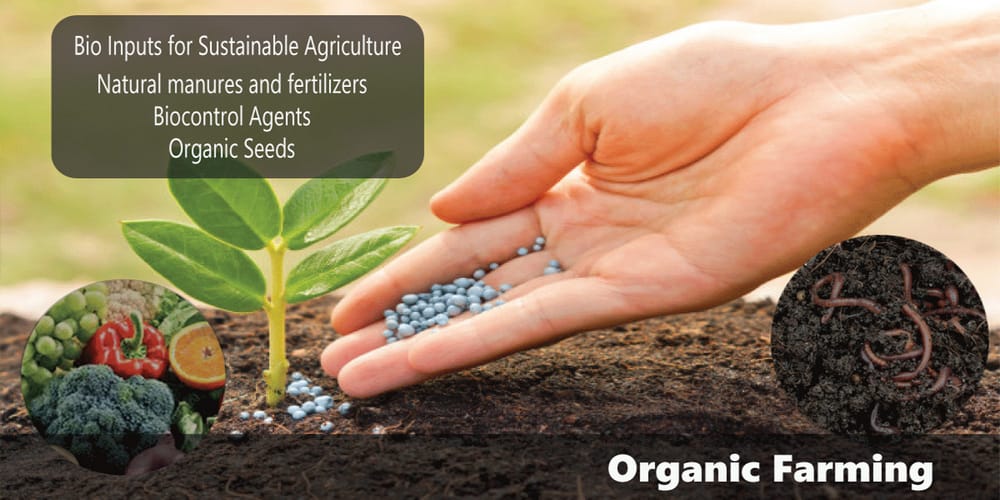Table of Contents
India needs more focus on organic farming
Organic farming and use of bio inputs is not new to India and has been practiced for centuries. Not only our country but also, all modern economies have been struggling to ensure food security for an ever rising population with limited per capita agricultural land. With the advent of chemical based fertilisers and pesticides that resulted in low cost and quick results, farmers felt relieved.
Despite the associated benefits of chemical fertilizers, the long-term use caused damage to the environment through soil and water pollution due to the leaching of harmful chemicals and also made the farm produce unfit for consumption. It also resulted in declining natural fertility of soil over the years. Owing to a host of issues, organic farming practices with bio-inputs came into picture.
Bio inputs range is classified under three main categories: Nutrient management (bio-fertilizers, enriched bio-compost, multi-microbial combination of bio-fertilizers and bio-fungicides in the soils); bio-pesticides (multi microbial bio-pesticides, botanicals, pheromones etc.) and growth enhancers (amino acids, micro nutrients, seaweed extracts, growth promoters and hormones, etc.).
Animal manures, plant based products (green manure, green leaf manure, oil cakes), compost and crop residues (sugarcane trash, cotton etc.) are some of the traditional bio inputs, which are the potential sources of nutrients. Biofertilizers, biopesticides, bio-herbicides, bio control agents, bio-organic manure, Vermiwash, spent wash, bio-activators and press mud are some of the modern bio inputs. These inputs are eco-friendly, target specific and easily biodegradable leaving no harmful effects on the environment.
Some key bio-inputs like bio-fertilisers are known to improve up to 25% better output with 20% cost reduction. However, the adoption rate of such inputs is still less due to lack of awareness and popularity of chemical based inputs. Various measures are being taken by the Government to support and popularize Organic farming practices. National centre of Organic farming (NCOF) in association with NABARD is working towards providing subsidy for the organic farming practices.
Recently, in March 2020, the state government of Bihar has pledged 155 Crore Rupees to promote organic farming in all 38 districts through development of organic corridor.
With the rising health concerns and awareness for climate change, bio-inputs based organic farming is gaining traction. Such natural inputs are also in line with the United Nations sustainable development goals (SDG) to protect the environment and also ensure safer food products. The changing consumption pattern that inclines more towards organic products, many business opportunities have been created in this space ranging from R&D to marketing of these naturally grown products. Organic farming method has gained huge popularity on international forums making it a hotspot for foreign investments and collaborations under guidance of bodies like NABARD and DARE-ICAR initiatives.
FocusAgritech’s Outlook
India is a net exporter of major farm products and with the rising preference for Organic food products, we see a huge opportunity to transition to organic mode of farming with bio-inputs and enhance net export revenues. These practises could be a great boost to improve farmer’s income and improve the global visibility of our indigenous products.
Public Private Partnerships (PPP) can help our farmers sell their organic produce through e-commerce platforms and also earn a certificate for the credibility of the claims of zero chemical inputs. With proper training and best practices Indian farmers can make the produce more consumer friendly as these are some of the unexplored areas. Solutions like mobile application support for farmers and convenient online marketplace for their organic farm products has a potential to catalyse the process in coming years.
Related Article
Brand Godrej carries the legacy of trust in Agriculture too
External Articles
17 Sustainable Development Goals of United Nations







